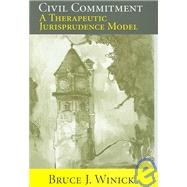
| Acknowledgments | xv | ||||
| Chapter 1 Toward A Therapeutic Jurisprudence Model for Civil Commitment | 1 | (16) | |||
|
1 | (3) | |||
|
4 | (2) | |||
|
6 | (5) | |||
|
11 | (3) | |||
|
14 | (3) | |||
| Chapter 2 Striking the Balance Between Coercion and Autonomy: Therapeutic Jurisprudence Insights on Coercion and Its Consequences and Application in the Civil Commitment Process | 17 | (24) | |||
|
18 | (4) | |||
|
22 | (1) | |||
|
23 | (1) | |||
|
24 | (2) | |||
|
26 | (10) | |||
|
36 | (1) | |||
|
37 | (4) | |||
| Chapter 3 Civil Commitment Criteria: An Overview | 41 | (58) | |||
|
41 | (7) | |||
|
48 | (11) | |||
|
59 | (7) | |||
|
66 | (3) | |||
|
69 | (2) | |||
|
71 | (1) | |||
|
72 | (1) | |||
|
73 | (26) | |||
|
73 | (2) | |||
|
75 | (6) | |||
|
81 | (5) | |||
|
86 | (7) | |||
|
93 | (1) | |||
|
94 | (5) | |||
| Chapter 4 The Limits of Parens Patriae Commitment: How Incompetency Should Be Defined and Determined | 99 | (20) | |||
|
99 | (5) | |||
|
104 | (6) | |||
|
110 | (1) | |||
|
111 | (5) | |||
|
116 | (3) | |||
| Chapter 5 The Outer Limits of Police Power Commitment: The Civil Commitment of Sex Offenders | 119 | (20) | |||
|
120 | (1) | |||
|
121 | (2) | |||
|
123 | (6) | |||
|
129 | (2) | |||
|
131 | (4) | |||
|
135 | (4) | |||
| Chapter 6 Application of Civil Commitment Criteria: The Civil Commitment Hearing | 139 | (26) | |||
|
139 | (1) | |||
|
140 | (2) | |||
|
142 | (3) | |||
|
145 | (4) | |||
|
149 | (5) | |||
|
154 | (7) | |||
|
161 | (1) | |||
|
162 | (3) | |||
|
162 | (3) | |||
| Chapter 7 Voluntary Hospitalization | 165 | (32) | |||
|
166 | (2) | |||
|
|||||
|
168 | (3) | |||
|
171 | (3) | |||
|
174 | (3) | |||
|
177 | (1) | |||
|
178 | (19) | |||
|
178 | (7) | |||
|
185 | (2) | |||
|
187 | (7) | |||
|
194 | (3) | |||
| Chapter 8 Rights Within the Institution and the Standards Governing Their Exercise or Waiver | 197 | (42) | |||
|
199 | (5) | |||
|
204 | (5) | |||
|
209 | (1) | |||
|
210 | (6) | |||
|
|||||
|
216 | (3) | |||
|
219 | (10) | |||
|
229 | (1) | |||
|
230 | (9) | |||
|
230 | (2) | |||
|
232 | (2) | |||
|
234 | (5) | |||
| Chapter 9 Outpatient Commitment | 239 | (50) | |||
|
243 | (3) | |||
|
246 | (9) | |||
|
255 | (5) | |||
|
260 | (16) | |||
|
276 | (4) | |||
|
280 | (1) | |||
|
281 | (8) | |||
|
281 | (3) | |||
|
284 | (5) | |||
| Chapter 10 International Human Rights Law Limitations on Civil Commitment | 289 | (36) | |||
|
290 | (3) | |||
|
293 | (1) | |||
|
294 | (3) | |||
|
297 | (10) | |||
|
307 | (8) | |||
|
315 | (3) | |||
|
318 | (2) | |||
|
320 | (5) | |||
| Chapter 11 Conclusion: Therapeutic Jurisprudence's Challenge to Civil Commitment Law and Practice | 325 | (8) | |||
| Index | 333 |
The New copy of this book will include any supplemental materials advertised. Please check the title of the book to determine if it should include any access cards, study guides, lab manuals, CDs, etc.
The Used, Rental and eBook copies of this book are not guaranteed to include any supplemental materials. Typically, only the book itself is included. This is true even if the title states it includes any access cards, study guides, lab manuals, CDs, etc.